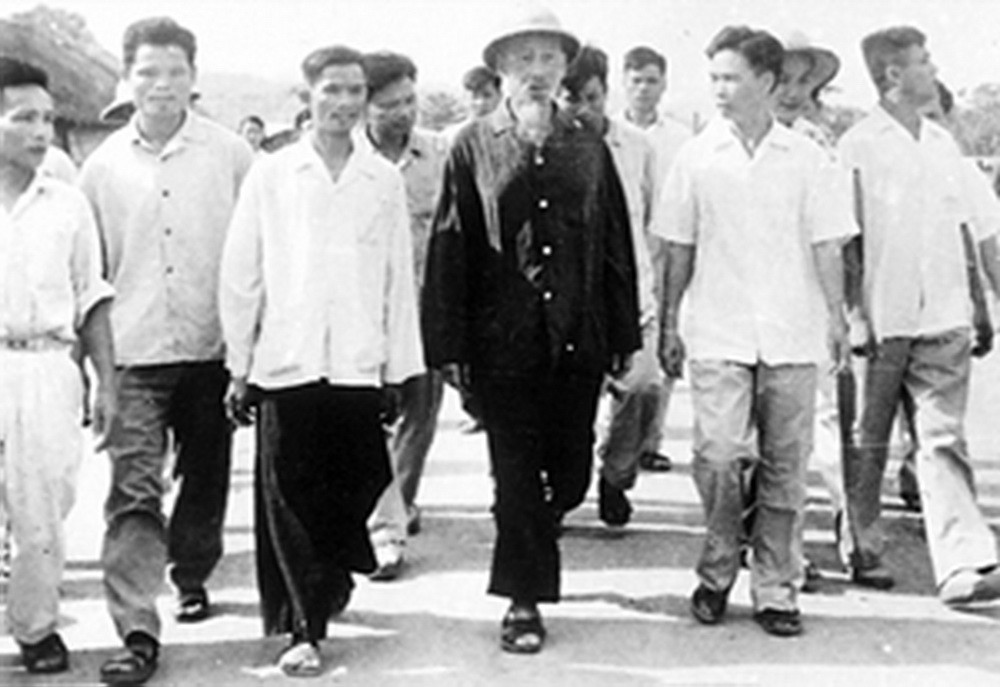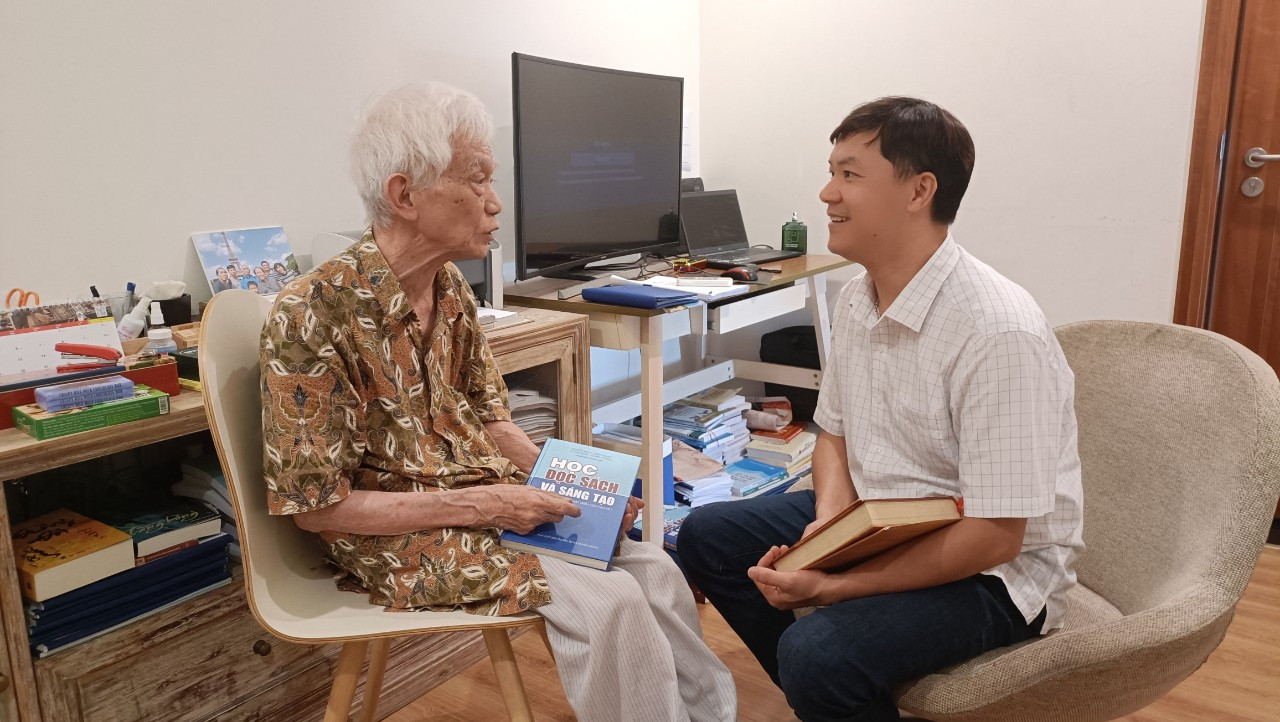Imbued with President Ho Chi Minh's thoughts on educational innovation
During his lifetime, President Ho Chi Minh opposed education based on formalism, favors, and authority.

On the occasion of the 134th anniversary of Uncle Ho's birthday, Associate Professor Dr. Dang Quoc Bao - former Director of the Academy of Educational Management shared his thoughts on educational innovation, democracy in schools and encouraging learning and talent.
Reference materials for UNESCO
- After many years of studying Ho Chi Minh's ideology, do you see that UNESCO's four pillars of education are related to his ideology of "Learning to work, learning to be human"?
- President Ho Chi Minh was awarded the title of World Cultural Celebrity by UNESCO. I was very impressed with the saying of a French writer: “Ho Chi Minh is a teacher of the culture of peace and tolerance”. In him, there is a combination of two factors: Peace and tolerance.
UNESCO's four pillars of education are: Learning to know; learning to do; learning to live together; learning to be; in which, the pillar "Learning to live together" is tolerance - one of two factors in Uncle Ho's personality.
On September 1, 1949, when visiting Nguyen Ai Quoc School, Uncle Ho wrote in the school's "golden book" a few words: "Learning to work, learning to be a human being". It was not until 1996 that UNESCO raised the four pillars of learning as above. Former Deputy Minister of Education and Training Tran Van Nhung sent all of President Ho Chi Minh's documents to UNESCO for reference. It can be seen that Uncle Ho's idea of "learning to be a human being, learning to live together" appeared nearly half a century before UNESCO.
On September 3, 1945, after President Ho Chi Minh read the Declaration of Independence, the Government Council held its first meeting. Here, he said, we are not familiar with administrative techniques and now we must start implementing those administrative techniques. It's okay, we will learn as we work. There will certainly be shortcomings but we are determined to correct them.
During the war against the US, our country had a school model that involved both studying and working. A typical example was the Hoa Binh Socialist Labor Youth School. This model was adopted by Cuba. They developed each school that involved both studying and working as a fortress to protect the revolution.
From the above data, it can be seen that our country has long paid attention to education. During the Ho Chi Minh era, this pillar became a philosophy in education.

Oppose education based on script, favor and authority
- According to Associate Professor, why did President Ho Chi Minh oppose education based on script, favors, and authority?
- Curriculum-based education, that is, only interested in exams. Uncle Ho once criticized this way of teaching, which only creates boxes and piles of books. His figurative words are very meaningful, because according to Uncle Ho, the "brainwashing" and dogmatic teaching style will not promote the creativity of the learner.
Exams are necessary, but don't turn them into authoritative education or favors. We need to "study truly, take real exams, have real talent" and live truly. President Ho Chi Minh once emphasized "study well, teach well", "do less, but do it properly". If we study, teach, and manage properly, we will have real talent.
In “one morning, one afternoon”, we can hardly eliminate the ideology of education based on examinations, authority, and favors. However, the practical innovation in the 2018 General Education Program and the changes in the way students are assessed are positive signals, the highlight of which is Resolution No. 29-NQ/TW, dated November 4, 2013 of the 11th Party Central Committee on fundamental and comprehensive innovation of education and training (Resolution 29).
After more than 10 years of implementing this resolution, education has had positive changes and achieved many important results, contributing greatly to the country's development and the industrialization and modernization process.
Accordingly, the national basic education system is basically completed in an open and interconnected direction between levels, qualifications and methods of education and training. In particular, the scale of education and the network of educational institutions are developed, better meeting the lifelong learning needs of the people.
Notably, the entire sector has actively implemented the 2018 General Education Program, shifting from focusing on imparting knowledge to comprehensively developing students' qualities and abilities. The implementation of a program with many textbooks and the socialization of textbook compilation and publication have initially created positive changes, initiative and creativity for teachers, students and schools.
It can be said that Resolution 29 marks a new step in the Party's strategic thinking regarding the cause of education and training development; at the same time, it demonstrates determination and strategic orientation for education in the short and long term.
- According to Associate Professor, how is President Ho Chi Minh's ideology on encouraging learning and talent expressed?
- President Ho Chi Minh's thought of encouraging learning and talent is still consistent and valuable until now. He did not want a system of education based on formality and favors. He focused on selecting talented and virtuous people. After the success of the August Revolution in 1945, he gave a presentation on selecting talented and virtuous people, hoping that localities would give advice to the State on selecting talented and virtuous people. President Ho Chi Minh especially emphasized and focused on talent and virtue in military, economic and diplomatic fields. General Vo Nguyen Giap - his outstanding student is a typical example.
- How is President Ho Chi Minh's ideology that schools must have democracy applied in today's practice?
- According to President Ho Chi Minh, there must be democracy in schools but on the basis of "teachers respect students, students respect teachers, not mullet fish as much as their heads". The proverb "Without teachers, you cannot succeed", but today, it is also necessary to understand that "Without students, you cannot succeed". Meaning, without students, who can the teacher teach? That is also a manifestation of democracy in schools.
In 1963, writing in Nhan Dan newspaper, Uncle Ho used the phrase, many of our teachers are very dedicated, so they deserve to be called su hinh (su is teacher, hinh means noble, su hinh means noble teacher).
Therefore, on the occasion of the 134th anniversary of President Ho Chi Minh's birth (May 19, 1890 - May 19, 2024), I sincerely hope that schools will always be imbued with his thoughts on education and training; focusing on training and fostering teachers who are always worthy of being "teachers".
Thank you, Professor!
